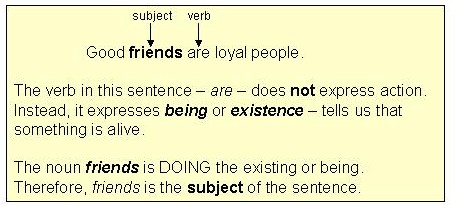
* For there to be beer in the fridge tends => There tends to be beer in the fridge. promotion by Subject-Raising (often obligatory).upstairs control of A-Equi deletion, plus downstairs deletion by Equiīill wanted to see the painting = Bill wanted (for Bill) to see the painting.The old man in the trenchcoat is coming => Is the old man in the trenchcoat coming? The ladies are arriving ~ The lady is arriving Virtually all tensed English clauses (including all simple sentences), require a Subject constituent.īesides its position before the verb phrase, the grammatical properties of a Subject include: Which have absolutive-ergative systems, do not support a meaningful concept of Subject.


Languages like Basque, Georgian, Quiché, or Pitjantjatjara, Subject is a grammatical concept restricted to languages with nominative-accusative systems, And there you have the subject.Subjects are noun phrases, and usually have more than one word in them, but they can be just one word, if there are no modifiers. Let’s look for the verb - “must rise.” Who must rise? We must rise.

Just remember the core question here: “Who or what is valuable?” Here’s another example:Īt the start of each morning, we must rise with the sun and meditate for 30 minutes.Ĭan you identify the subject in this sentence? It’s headed off with a prepositional phrase ("at the start of each morning") and none of that is part of the subject. Rather, they link the subject to further information. The verb in this sentence is “is.” It’s one of the most popular linking verbs, which are slightly more difficult to label than action verbs. You can begin by asking yourself what’s valuable? You’ll know the answer is “time.” More to the point, you could even say the noun phrase "the time we spend with our children" is the subject. This may (or may not) confuse you when trying to pinpoint the subject, as the subject isn't necessarily at the beginning of the sentence. In this sentence, the predicate (the part that’s modifying, or providing further information about the subject) is placed at the beginning of the sentence. Here’s a curveball:Įven more valuable is the time we spend with our children.

Although the typical sentence construct is subject + verb + direct object, not every sentence follows this exact formula.


 0 kommentar(er)
0 kommentar(er)
